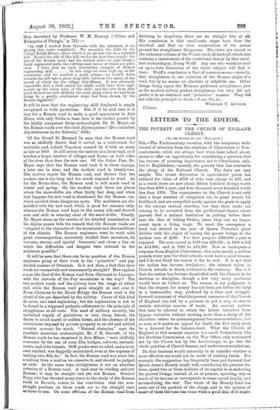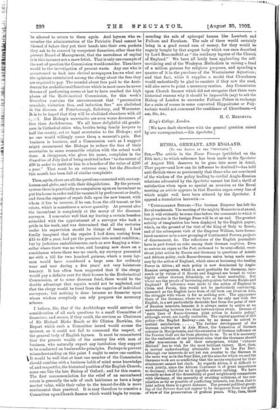LETTERS TO THE EDITOR.
THE POVERTY OF THE CHURCH OF ENGLAND CLERGY.
ITO TIIM• EDITOR OP TEE " SPRCTATORI
SIR, —The Parliamentary vacation, with the temporary with- drawal of attention from the relations of Churchmen to Non- conformists, which are always best when least talked about, seems to offer an opportunity for considering a question that has become of pressing importance, not to Churchmen only, but to Englishmen,—namely, the poverty that has overtaken the clergy of the National Church. The facts are very simple. The recent depression in agricultural prices has reduced the value of £100 of tithe rent charge to £67, and as a result there are now about fifteen hundred livings worth less than £100 a year, and four thousand seven hundred worth less than £200. The consequence to the Church is not only that a large number of clergymen are in great straits for livelihood, and are compelled sorely against the grain to apply to the various clerical charities, but that their ranks are ceasing to be recruited from the professional classes, where parents feel a natural hesitation in putting before their sons the idea of taking Orders, since they can no longer count upoli a living wage. To meet the emergency a fund was started in the year of Queen Victoria's great Jubilee with the object of raising the poorer livings to the modest sum of £200. For that purpose £400,000 a year is required. The sum raised in 1899 was 221,619 ; in 1900 it fell to £14,966; and in 1901 to £14,308. Now so inadequate a response from English Churchmen, who raise nearly a million pounds every year for their schools, must have a good reason ; and I do not think the reason is far to seek. It is not that the nation has become irreligious ; the interest taken in Church schools is direct evidence to the contrary. Nor is it that the nation has become dissatisfied with the Church in its doctrine or discipline, though a few very noisy partisans would have us believe so. The reason, in my judgment, is that the request for money has not been put before the laity in a businesslike way, prefaced by a clear and straight- forward statement of what the present resources of the Church of England are, and by a promise to put a stop at once to certain notorious sources of waste. An ancient institu- tion may be allowed to retain the habits inherited from bygone centuries without exciting more than a shrug of the shoulders unless its mismanagement becomes scandalous ; but as soon as it makes an appeal for funds, the first reply must be a demand for its balance-sheet. What the Church of England at this moment requires is a small Commission, like the Dawkins Commission on the War Office, only nominated not by the Crown but by the Archbishops, to go into the whole question of Church finance, and make recommendations.
Its first business would naturally be to consider whether a more effective use could not be made of existing funds. For example, the suggestion has frequently been put forward that Queen Anne's Bounty might well, considering the present dis- tress, spend two or three millions of its capital in re-endowing the poorest livings, instead of, as at present, spending only as much of its income as corresponds to sums raised locally, and accumulating the rest. The whole of the Bounty fund has come out of the pockets of the clergy, and in the opinion of many of them the time has come when a good deal of it might be allowed to return to them again. And laymen who re- member the administration of the Patriotic Fund cannot be blamed if before they put their hands into their own pockets they ask to be assured by competent financiers, other than the present Board of Management, that the sacredness of capital is in this instance not a mere fetish. That is only one example of the sort of question the Commission would consider. Then there would be the investigation of present waste. Any one who is accustomed to look into clerical newspapers knows what are the opinions entertained among the clergy about the fees they
are required to pay. The scandal about fees paid to the Arch- deacon for archidiaconal functions which in most cases he never dreams of performing seems at last to have reached the high places of the Ecclesiastical Commission, for this week's Guardian contains the announcement that "procuration synodals, visitation fees, and induction fees " are abolished in the dioceses of Peterborough, Salisbury, and Worcester. It is to he hoped that they will be abolished elsewhere with all But Bishop's secretaries are even worse devourers of fees thin Archdeacons. We all know delightful old gentle- men in Cathedral cities who, besides being family lawyers to half the county, act as legal secretaries to the Bishops ; and no one would willingly cause them a moment's pain. But business is business, and a Commission such as I suggest might recommend the Bishops to reduce the fees of their secretaries to some reasonable relation with the actual work done. A clergyman, who gives his name, complains in the Guardian of July 2nd of being mulcted in fees "to the extent of £30 in order to institute him to a benefice of the value of £200 a year." That must be an extreme case ; but the Standard this month has been full of similar complaints.
Then, again, there are all the questions connected with rectory- houses and glebe, and with their dilapidations. By the present system there is practically no compulsion upon an incumbent to put his house in order until he vacates it by preferment or death; and then the expense of repair falls upon the new tenant, with whom it lies to recover, if he can, from the old tenant, or his estate, which is sometimes a minus quantity. At present also the incumbent is completely at the mercy of the diocesan surveyor. I remember well that my leaving a certain benefice coincided with the appointment of a surveyor who took a pride in his work, and was determined that all the rectories under his supervision should be things of beauty. I had fondly imagined that the repairs I had done, costing from £15 to £20 a year, had put the premises into sound condition ; but by judicious embellishments, such as new flagging a wine- cellar where there was no wine, and hanging new doors on a coachhouse where there was no coach, my surveyor presented me with a bill for two hundred guineas, which a mere lay- man would have considered a large sum for ordinary wear and tear during a five years' not very boisterous tenancy. It has often been suggested that if the clergy would pay a definite rent for their houses to the Ecclesiastical Commission, or to some diocesan fund, there would be the double advantage that repairs would not be neglected, and that the clergy would be freed from the vagaries of individual surveyors; but nothing is done because no financier upon whose wisdom everybody can rely prepares the necessary
scheme. , I believe, Sir, that if the Archbishops would entrust the consideration of all such questions to a small Committee of financiers, and secure, if they could, the services as Chairman of Sir Michael Hicks Beach or Sir Clinton Dawkins, the Report which such a Committee issued would arouse the interest, as it could not fail to command the respect, of the general body of English laymen. It must be remembered that the present wealth of the country lies with men of business, who naturally expect any institution they support to be conducted on businesslike principles. Perhaps to prevent misunderstanding on this point I ought to enter one caution. It would be well that at least one member of the Commission should combine with a business habit of mind some knowledge of, and respect for, the historical position of the English Church; some one like the late Bishop of Oxford ; and for this reason. The first recommendation for the relief of an encumbered estate is generally the sale of such heirlooms as have a large market value, while their value to the tenant-for-life is more sentimental than practical. It is easy therefore to conceive a Committee upon Church finance which would begin by recom-
mending the sale of episcopal houses like Lambeth and Fulham and Farnham. The sale of these would certainly bring in a good round sum of money, for they would be eagerly bought by that august body which was once described by Lord Beaconsfield as " the residuary legatee of the Church of England." We have all lately been applauding the self- sacrificing zeal of the Wesleyan Methodists in raising a fund of a million guineas for religious purposes, and spending a quarter of it in the purchase of the Westminster Aquarium ; and that fact, while it supplies a model that Churchmen would undoubtedly be glad to emulate if they saw the need, will also serve to point a necessary caution. Any Commission upon Church finance which did not recognise that there were historical reasons why it should be impossible (say) to ask the Bishop of London to surrender Fulham Palace in exchange for a suite of rooms in some converted Hippodrome or Poly- technic would not command the confidence of Churchmen.—I am, Sir, &c., [We have dealt elsewhere with the general question raised by our correspondent.—En. Spectator.]







































 Previous page
Previous page